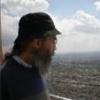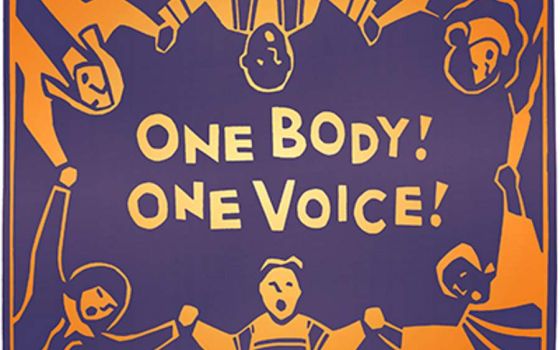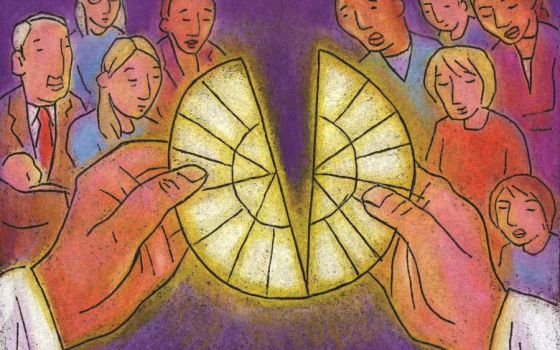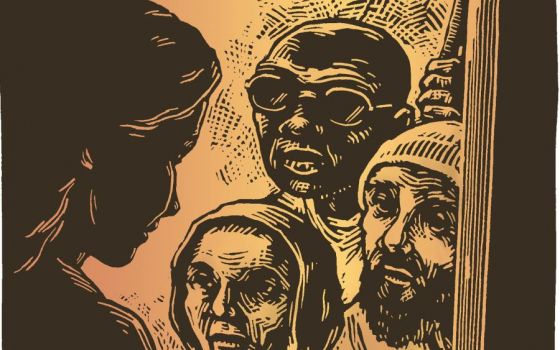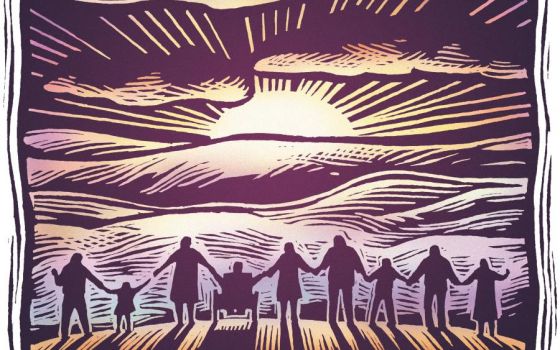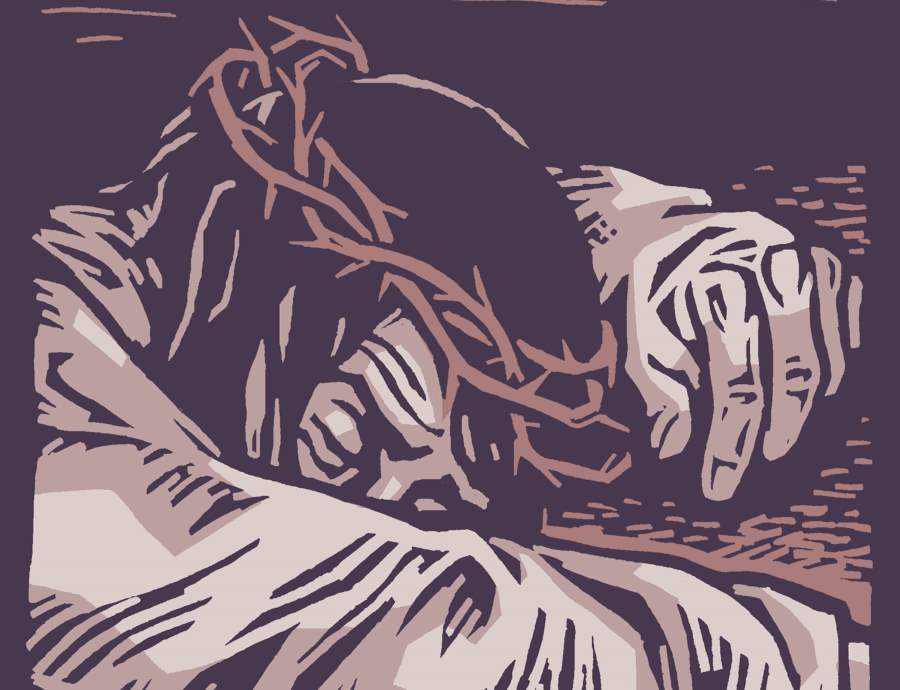
Should the Gospel we profess and the liturgy we do raise in us some great unease with the political, economic, military and environmental conditions that are our responsibility as U.S. citizens and residents? If so, how do we grapple with the apparent absence of such unease in our churches?
How often and easily we take the wind out of the sails of the great notions in our scriptures and our poetry. We do this quite literally in the case of Pentecost, where that odd piece of the liturgy called the "sequence" is Veni, Sancte Spiritus. Two of the middle verses in the Latin boldly demand: Lava! Riga! Sana! And: Flecte! Fove! Rege!
Lava quod est sordidum,
Riga quod est aridum,
Sana quod est saucium.
Flecte quod est rigidum,
Fove quod est frigidum,
Rege quod est devium.
Here's one way not to hear those lines, a literal translation: "Cleanse that which is unclean, / water that which is dry, / heal that which is wounded. / Bend that which is inflexible, / fire that which is chilled, / correct what goes astray."
As they say, it doesn't sing. Those three long syllables in five of the six lines, "that which is," are just too much to replace the quick quod est of the Latin. Quod est: two short syllables, and that leaves the Latin poet five syllables to begin and end each line. Another translator/poet does better at least with the flecte/fove lines:
Shake with rushing wind our will.
Melt with fire our icy chill.
This is one bit of the rite by which we keep Pentecost in June this year. It seems a feast of verbs, a feast of imperatives as we shout to this Holy Spirit/Advocate/Paraclete, this "Holy Ghost" who, Hopkins imagined, "over the bent / World broods with warm breast and with ah! bright wings."
The verb is "broods." That worthy verb and the adjective "bent" do what poetry alone can do: break open our starving imaginations so we can grasp how it is. We can still walk away, but only knowingly. We are, of course, that bent world. How bent? Yesterday, I read in just a few pages of the New York Times about Christians killing Christians in South Sudan. About Muslims killing Christians in Nigeria. About Christians killing Muslims in the Central African Republic. About Syrian peace talks breaking down and breaking up. About. About. About. You can finish the sentences. The bent world.
Then this morning I joined a small group at a Manhattan church to watch the film "Of Gods and Men." I have written about this story-from-life before, but I felt today how much the story can help our reflections this year about where the attention of our Christian assemblies should be. It is the story of the nine Trappist monks who lived and served and prayed in a remote area of Algeria for many years. Because of ongoing conflicts in the area, about 20 years ago the Algerian authorities asked them to leave their monastery or to accept police protection against the armed militias of what are being called "Islamist" groups. This ongoing violence in Algeria followed elections where the Islamist parties won a plurality, but had not been allowed to assume any leadership in the government.
The monks refused protection, and the film is largely about their painful arrival at a decision to stay in their monastery unprotected. In part that decision hinged on what they had come to know through lives lived as neighbors to poor village people in this Muslim community. In the end, seven of the monks were taken prisoner by a militia. The full circumstances of their violent deaths remain unclear even today.
We cannot isolate this story "of gods and men." It is bound up with the economics and human dynamics of colonialism. It is bound up also with the European Christians' treatment, century after century, of all things Muslim. And bound up somehow also with the centuries before European incursions into these lands when Muslims, Christians and Jews lived side by side and most often peacefully, from Andalusia to Persia.
As Christian monks and local Muslim people interact in this film we ask: Why not? Why not such mutual respect among those who live in these traditions? Why not such conversations? Why not familiarity with each other's holy books, each other's saints and holidays, each other's ways of weaving into ordinary days the magnificence of poetry and songs and the everyday expressions that help us along our way: "God bless you," "Insha'Allah" (God willing), "Thanks be to God"? How long and deep is this hostility that still leaves so many on various sides unable to imagine a future together? What is our "unease" here, our failing, our responsibility?
In the March Celebration I suggested that the "mea culpa" of the Confiteor is terribly inadequate to let us grasp how sin and evil happen in this bent world. If we speak of "fault" and of responsibility for evil done today — whether it is sectarian, economic, racist, sexist, on and on — we must speak of nostra culpa, our fault. We are inevitably blinded when we conceive of sin and evil to be ever and always individual. Then I'm off the hook for all these deeds and all this suffering.
Can we look again and see evil, sin, for which no single one of us is alone responsible? Failing in this, we do not name these pervasive evils as sin, do not take responsibility, do not relate them to the commitment of our baptism to renounce evil, do not relate them to our Gospel faith. "It's not my fault that African Americans are in prison out of all proportion to anything." "Is it my fault that Christians and Muslims in Africa are killing each other?" "Is it my fault that those Iraqis are still dying from the depleted uranium we used all over their country?" No, it is not my fault. But is it our fault? Do we do evil and consent to evil together as well as alone? This seems obvious.
If mea culpa is inadequate, there is another phrase of the Confiteor, as it has been since Vatican II, that is insightful, a Gospel-based way of understanding evil: "in what I have done and in what I have failed to do." Do we unfold this essential insight in preaching and teaching? Do we ever bring up this problem in discussion of so many problems? Do we realize how the judgment story in Matthew 25 bases condemnation not on what these folks did but on what they did not do? "I was hungry and you gave me no food, thirsty and you gave me no drink, a stranger and you did not take me in, naked and you did not clothe me, sick and in prison and you did not visit me."
Certainly we "always taught" about sins of omission, but somehow the ritual acknowledgment of this in the Confiteor didn't take hold of us: How do we free ourselves, as we must, to understand and agonize over the evil done today to the world's people and to nature itself? Then how do we understand responsibility for what we have failed to do? Here also we see that "what I have failed to do" is true, but this also must be in the plural. The nostra culpa is simple honesty. Sin and evil go far beyond the lies I tell, the poison I spread, the economic decisions I make, the killing I do myself. And sin and evil are far more than the killing I could have stopped all by myself and didn't, the fossil fuels I personally could have not burned, the laws I personally could have made or changed but didn't.
What makes this so difficult to accept? A lot. Little in our dominant American culture supports such an understanding of responsibility being shared; little supports a notion that our shared responsibility extends beyond what evil we do individually. Does our sin, our evil, include that evil we could oppose but do not, that evil we do not seek to lessen or end? We make baby steps when we deal with collections of money for victims of wars and famines, but even here we want to think about this as our generosity rather than our responsibility. And we seldom are willing to see that we are in this failure together. Together we "have failed to do."
In Islam there is something like this: The believer is to "prevent evil." Exactly! We would do well to consider that we also are bound by our faith to do such preventing. Perhaps we fear this and so, in defense, have separated our personal morality from ever seeing that the great ills of our day are deeds for which we together may be responsible, not for doing them only but for failing to stop them.
Advertisement
This is hard. I found helpful what Cornel West said recently in a talk about the legacy of Dorothy Day.
She knew that indifference to evil is more evil than evil itself. It becomes a way of life, a hardening of the heart and a coarsening of the conscience, a chilling of the soul and a turning away from the vulnerable, the despised, and the weak. Indifference is the one trait that makes the very angels weep.
Wouldn't we want to see our church — I mean first of all our assembly, the people who do the Sunday Eucharist together — shake off such indifference to evil, soften our hard hearts, sharpen our coarse consciences, warm our cold souls, turn ourselves toward the troubles of the vulnerable, the despised, the weak? Wouldn't that be something? This can't be a "let's do it for Lent" sort of thing that is put away until next year. It would be the slow and steady study and conversation and, more than anything, struggle to understand how such communal evil is done and done, more often than not, by what we do not do.
The prior of the Trappist community in Algeria, one of those kidnapped and murdered, had written a letter to be opened should all that come about. In this letter, he speaks of just this situation: our involvement in evil. "My life has no more value than any other. Nor any less value. In any case, it has not the innocence of childhood. I have lived long enough to know that I am an accomplice in the evil which seems to prevail so terribly in the world, even in the evil which might blindly strike me down." Can we not say the same?
That's the challenge, that struggle to see and to understand. We're not talking about deciding on a bake sale for the war victims, we're talking about trying to understand the "why" of our situation as Gospel folks in the early 21st century who happen to live in the United States, the world's great economic and military empire. That's where we have to go, but there's plenty of "why" to ask on the local level also.
This is how the Spirit broods over the bent world. In us. In fact, when we return to those two short verses of the Pentecost sequence, and when we list the imperative verbs that begin each line (Lava! Riga! Sana! Flecte! Fove! Rege!), we realize that this is not simply ourselves calling out to the Holy Spirit, but the Spirit calling out to us, to the church, to the bent world: Scrub! Drench! Heal! Shake! Melt! Fix!
Or something like this:
Scrub the stains and
Rain on the dry.
Mend what's ripped but
Shake what's stiff.
Melt the frozen and
Raise up the broken.
All this is deeply personal, but personal because we are individually part of the communal doing and the communal failing to do. As Dorothy Day knew well, we can't do this without a twofold ongoing study, and that is all the more true today.
In the first place, our study has to be of our scriptures, prophets and Gospels, especially as they come Sunday by Sunday.
In the second place, our study has to be of the ways Spirit-filled people, working in many media, give us ways to see and understand the world we've made. For Dorothy Day, that was Dostoyevsky first but also many other thinkers, writers and artis. What poems, dramas, novels, films, histories, documentaries will teach us?
Editor's Note: This reflection was originally published in the June 2014 issue of Celebration.
